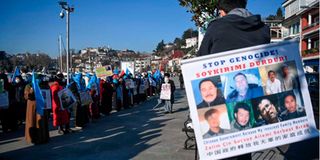China refuses to budge on Xinjiang despite mounting pressure

Members of Uighur minority hold placards as they demonstrate to ask for news of their relatives and to express their concern about the ratification of an extradition treaty between China and Turkey, on February 22, 2021 near China consulate in Istanbul.
What you need to know:
- In heated sessions at the UN Human Rights Council, Washington accused Beijing of targeted abuse of ethnic minorities, citing Xinjiang and Tibet where possible heinous crimes have occurred.
The US government is piling new pressure on China to allow unfettered access to human rights monitors in the Xinjiang region, where Beijing has been accused of violations.
In heated sessions at the UN Human Rights Council, Washington accused Beijing of targeted abuse of ethnic minorities, citing Xinjiang and Tibet where possible heinous crimes have occurred.
Mark Cassayre, the US Deputy Head of Mission to the UN in Geneva, said Beijing must allow investigators in to prove there have been no atrocities.
“We condemn China’s abuse of members of ethnic and religious minority groups, including crimes against humanity and genocide in Xinjiang and severe restrictions in Tibet,” Cassayre said, referring to the two of China’s semi-autonomous regions Beijing has been accused of cracking down.
Washington which had quit the Council during Donald Trump’s years returned to the rights body only in February, part of President Joe Biden’s pledge to return his country to the community of nations that respects global rights and freedoms.
But the US stance followed a similar demand by the UK which told the Council that London was “deeply concerned by the extensive and systematic human rights violations in Xinjiang, including credible reports of forced labour and forced birth control.”
Encampment claims
The council, the organ where each member State is reviewed on its human rights record is composed of all manner of countries, including those accused of violations.
Currently, there is an ongoing session where statements are issued on the performance of each member State as well as targets it should have met. Those statements may carry no enforcement powers but they could be a public relations disaster.
The US comments came as Secretary of State Antony Blinken prepared to meet with Chinese Foreign Minister Wang Yi in Anchorage on March 18. Blinken said this week he intends to discuss a wide range of issues including those where Washington and Beijing have big disagreements on.
China has been fighting claims of forced encampment of minority Uighurs and other ethnic communities in Xinjiang, where Beijing is accused of holding more than 1.8 million people in internment camps since 2017, according to rights groups.
Dolkun Isa, President of an Uighr lobby in Germany, told Radio Free Asia on Friday he hoped Blinken presses Wang on the atrocities.
“The Biden administration’s strong position on holding China accountable for committing both genocide and crimes against humanity against Uyghurs and other indigenous people of East Turkestan give us great hope and assurance,” Isa said.
Locals in Xinjiang refer to the north-western region of China as East Turkenstan.
“We hope that Secretary Blinken and Advisor Sullivan will make the following demands from Chinese officials,” Isa said.
Allies' voices
China, however, employed voices of its allies to push back the pressure. Cuba, a longtime ally of Beijing issued a statement on behalf of 64 other countries defending China.
Bruno Rodriguez, Cuba’s Foreign Minister said Havana “rejects foreign interference in China's internal affairs” in the way it has dealt with Xinjiang, Hong Kong and Tibet, three regions where Beijing has been accused of violations.
The joint statement said both sides must seek to promote and protect human rights, use dialogue but oppose politicisation of rights issues as well as double standards.
In fact, it defended China’s record, saying the policies imposed in Xinjiang have in fact reduced violent extremism, making the region safer.
Beijing itself says it would be open to allowing monitors. Although it was unclear how free they will be to investigate the matter.
Critics said, however, the statement was issued after Beijing pulled economic levers on the countries that signed on it, most of them in Africa and Latin America.
Cuba, which is sitting on the Council, for the fifth term since 2006 has also been accused of rights violations back home, according to all the last three Universal Periodic Review (UPR). Havana has opposed 139 of the 255 resolutions passed, touching on rights violations in the 12 years it sat on the council.
Sophie Richardson, China Director for Human Rights Watch, accused Beijing of being on the defensive rather than collaborating with critics to clean its image.
“No government likes criticism but the Chinese government has a disturbing track record of not just rejecting criticism but threatening the experts and offices across the UN human rights system responsible for bringing human rights violations to light,” she said after China’s delegation accused a UN rapporteur of unprofessionalism in a report on Xinjiang this month.
“These more personal and public attacks, coupled with patently hypocritical calls for accountability, may signal a darker turn.”





